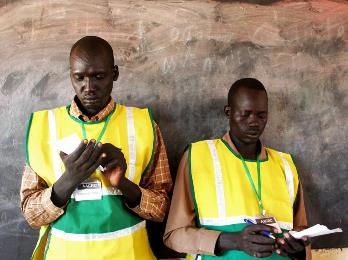South Sudan calls for more international involvement on Abyei’s dispute
August 25, 2017 (JUBA) – A leading South Sudanese minister Friday called for more international efforts to fix the stalled situation in Abyei area, pointing that the deployment of an international force in the border contested area has averted an unimaginable humanitarian situation.

Further, it comes after a call by the United Nations Security Council and the African Union Peace and Security Council for Khartoum and Juba to not only to form the joint administration but also to activate the demilitarised border zone and to deploy joint border patrols agreed in September 2012 as part of the Cooperation Agreement.
“The issue of Abyei is the responsibility of the international community to work together to the two parties so that the outstanding issues are resolved amicably,” cabinet affairs minister Martin Elia Lomuro told Sudan Tribune on Friday.
“It is not an issue which should be pushed to the two parties to resolve alone. It requires international support for the parties to close the gaps and overcome the challenges through mutual understanding,” explained Minister Lomuro.
The statements are seen as an indirect response to the growing international criticism for Juba on its “refusal to cooperate” with the different messages on Abyei and the buffer zone sent by the African Union and the United Nations.
The cabinet minister, who is an ally of President Kiir in the unity government, said international community should persuade Sudanese President Omer al-Bashir to accept a peaceful dialogue to resolve the impasse.
“His Excellency President Salva Kiir as you know and as everyone knows is a humble man. He is a peace loving person and wants the issue of Abyei to be resolved through peaceful dialogue. The international community should, therefore, work with the Sudanese government to ensure there is a reciprocation of the same spirit and will. It cannot be pushed to the leaders like that. No. The Abyei protocol was negotiated and the international community, particularly the United States played an important role. They need to continue playing this important role until a lasting settlement is found,” he said.
The administration of former President Barak Obama gradually distanced itself from Juba after years of strong support by President George Bush during the years of peace negotiations with Khartoum and the implementation of the Comprehensive Peace Agreement. President Donald Trump’s administration, for the time being, is busy with internal affairs and other international files are seen more urgent.
The South Sudanese official, also, commended the government of Ethiopian for shouldering peacekeeping responsibility and acting as a de facto government in the area since 2011 following military activities.
“The intervention of the international community to deploy a peacekeeping force from the Ethiopia has averted the unimaginable humanitarian situation. If there was no neutral force in the area, the tension that was in the area would escalate into the unimaginable humanitarian situation. It averted war,” he said.
Lomuro further said the United Nation peacekeeping force currently in control of the situation of the contested area should remain there until when a solution is found through amicable solution between the parties.
Last May, the Security Council threatened to stop its support for the awaited joint border forces between Sudan and Sudan if they parties fail to operationalise it soon. The warning comes in line with Washington’s demand to reduce the number of peacekeepers deployed in the different operations as it is operating significant cuts in its financial contribution.
(ST)
